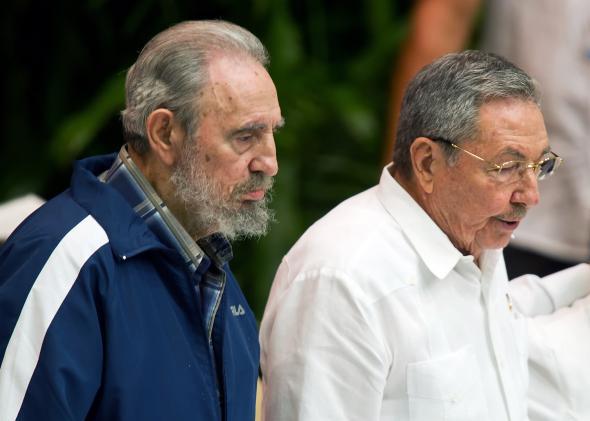Defenders of the U.S. embargo on Cuba sometimes sound like the communist ideologues they’re targeting, promising that despite decades of failure, the worker’s paradise is just around the corner.
The Washington Post, for instance, argued in a surprising editorial that this week’s moves by the White House to lift some of the restrictions on commerce with Cuba were an “underserved bailout” for the Castro regime. The argument is that “the outlook for the Castro regime in Cuba was growing steadily darker” due to economic distress and a growing opposition movement, and then the Obama administration gave the Castros an undeserved shot in the arm.
The embargo has clearly hamstrung the Cuban economy for decades, a situation likely to be worsened by the impending economic collapse of the regime’s main benefactor, Venezuela. But the goal of the embargo wasn’t to make Cuba poor. It was to topple the Castro regime. After 53 years and 10 U.S. presidents, we’ve seen enough evidence to declare that goal a failure.
Obama’s Cuba move provides an opportunity to reflect on the utility of U.S. economic sanctions shortly after another major international story: the dramatic crash of the Russian ruble.
The sanctions aren’t the main reason, or even one of the main reasons, for the Russian crash. Years of economic mismanagement and the dramatic fall in oil prices over the last few months are much more important factors. But that hasn’t stopped administration officials from doing some off-the-record gloating about their role in wrecking the Russian economy. There’s some justification for this—as Michael Crowley of Politico writes, “key Russian lenders find themselves cut off from foreign financing at a moment of stress for major Russian businesses.” In a press conference yesterday, Vladimir Putin himself blamed sanctions for about 25 percent of the ruble’s fall.
But the end of the Cuba embargo, with a Castro still in power in Havana, ought to be the source of some humility for the United States as we consider using economic pressure on another rival. Putin is still overwhelmingly popular and continues to portray Russia as the victim of a Western plot to limit its power. As I wrote on Tuesday, he doesn’t seem like he’s in a hurry to de-escalate tensions, no matter how much inflation and a stagnant economy hurt ordinary Russians.
The U.S. is clearly capable of inflicting economic pain on other countries, but its record of actually getting those countries to do what it wants is more mixed. According to one estimate from the Peterson Institute for Economics, which looked at 174 instances of U.S. sanctions between World War I and 2006, those sanctions at least partially accomplished their political goals just 34 percent of the times.
There are cases when sanctions are effective, but circumstances are important. Sanctions like the Cuba embargo, which aimed to foment a revolution or topple a regime, aren’t successful very often.
“When they do have a better track record is when you’re asking for more tangible concessions,” Daniel Drezner, a political scientist at Tufts, prolific foreign-policy blogger, and author of The Sanctions Paradox, told me. He points to the U.S. sanctions on Iran, which have clearly played a role in pushing Tehran to the nuclear negotiating table, and are likely more effective because it’s “clear [the Obama administration] isn’t looking for regime change.”
Sanctions are also more likely to work when imposed on countries that have a large and active opposition movement, such as South Africa during apartheid. Otherwise, it’s easy enough for a an autocratic leader to use sanctions for propaganda purposes—to blame poor economic conditions on foreign powers, as Putin is doing today and Saddam Hussein did in the years leading up to the Gulf War.
Even when sanctions “work,” the effects can be fleeting. Myanmar, another go-to example of sanctions success, now appears to be backsliding on many of the human rights commitments it made during its political opening a few years ago.
Going forward, it could be even more difficult to impose effective sanctions given the ongoing impasse between the White House and Congress. If Obama lifts sanctions on Iran in exchange for nuclear concessions, he will likely have to do so by making an elaborate legal end run around Capitol Hill. Congressional Republicans will almost certainly try to stymie Obama’s new Cuba policy. It’s hard for sanctions to be effective if no one believes the leader who’s negotiating with them has the power to lift them.
Despite their limitations, sanctions remain a popular policy option. Just this week, even as he was chipping away at the half-century old embargo, Obama signed into law new sanctions on Venezuelan officials and is expected to authorize new sanctions on Russia.
It’s possible to make the case that the Cuba embargo is finally working: With his political biological clock ticking, Raúl Castro wants to put his country on more secure economic footing ahead of what’s sure to be a fraught political transition. This will require ending Cuba’s international isolation and could push him toward further economic and political reforms.
But 53 years of stagnation followed by modest market reforms isn’t what John F. Kennedy had in mind in 1961. It’s time we started to be a little more realistic about what American economic pressure can achieve.
